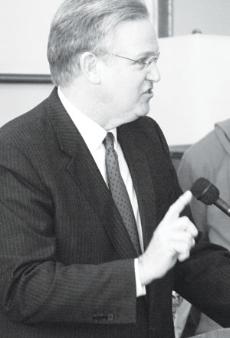Higher ed gets good news

Missouri Gov. Jay Nixon speaks Wednesday at the Reynolds Alumni Center on the campus of the University of Missouri-Columbia. Nixon announced his plan for higher education that includes no appropriation cuts provided institutions do not raise tuition for the 2009-2010 academic year.
Despite a state budget shortfall projected to reach as much as $342 million, Missouri Governor Jay Nixon announced this week there will be no cuts to higher education for fiscal year 2010.
That’s good news for students at Missouri’s public institutions, who won’t see a raise in tuition or academic fees for the 2009-10 school year as part of the budget agreement.
“Today I’m proud to announce it’s going to be different in the state of Missouri,” Nixon said Wednesday on the campus of the University of Missouri – Columbia. “I’m proud to announce that Missouri students will not see a tuition increase next year, period.
“The leaders of Missouri’s four-year public institutions and I have spent the last several weeks carefully reviewing the budget and planning for our future,” Nixon added. “We know that a highly trained workforce is vital if we’re going to turn this economy around and we share the common priority of providing a high-quality, affordable college education for students around Missouri.”
The announcement comes after months of speculation about next year’s higher education budget. Public institutions had been told to provide scenarios for 15, 20 and 25 percent cuts in state appropriations. Missouri Southern received $25,597,158 from the state for the current fiscal year.
As part of the agreement, public four-year colleges and universities have pledged not to increase tuition rates or academic fees for the next school year.
“In my fiscal year 2010 budget proposal, Missouri’s public four-year institutions will receive stable funding,” Nixon said. “The same amount they received in 2009. They will be spared the cuts.”
University President Bruce Speck applauded the proposal, but said Southern would still have to make cuts to some areas.
“Facing the possibility of a minimum 15 percent cut, this is a good compromise and I think it’s very helpful,” Speck said. “Clearly we still have costs that will increase and we’ll need to make sure we can pay the bills, so it doesn’t mean that we won’t have to make some cuts and make some decision about how we’re going to move forward.
“Although I think the governor’s idea is very good and very helpful, on one hand not having any new money means you have to find money for the increased costs,” Speck added. “That money won’t come from an increase in tuition, it’ll have to come from an internal reorganization of our resources.”
To prepare for cuts in state funding, Southern initiated a series of changes on campus to replenish the school’s reserves. One of the first moves implemented was a moratorium on travel, and that’s likely to stay in place, Speck said.
Speck said Southern is also considering passing off part of the cost of insurance premiums to employees. The University currently pays the entire premium, costing more than $400 per month per employee.
“If employees paid $100, which would be 25 percent, that would net us $50,000 per month,” Speck said. “That change would not go into effect until next January because we already have a whole year of insurance we have committed to.”
Nodler optimistic about plan’s chances in General Assembly
State Sen. Gary Nodler (R-Joplin) supports the proposal and told Nixon during the transition period he was hopeful the state could avoid significant cuts to higher education.
“A goal to avoid cutting the core budgets is a worthy one and I support that goal,” Nodler said. “I also like the idea in these economic times there’s a commitment by the universities not to raise tuition.”
Nixon’s full budget request hasn’t been submitted, however, and the governor didn’t answer questions Wednesday about where the money will come from to fund the proposal, instead saying he would bring up the issue in his State of the State Address next week. The budget agreement still must be approved by the General Assembly.
“Until the governor’s full budget request is submitted and we look at how he proposes to pay for this initiative, I can’t guarantee it will complete the appropriations process in exactly this form,” Nodler said. “So I can’t guarantee this will happen but I also won’t say that it won’t happen and I hope at the end of the process we are able to find a way to accomplish this.”
Nixon won’t balance budget on backs of higher education
Nixon vowed in his speech to present a balanced budget proposal Tuesday in his address to the House and Senate. Calling it a “tough decision in a difficult budget year,” Nixon said he will not balance the budget on the backs of higher education.
“The future we’ve got is out there getting people for 21st century jobs,” Nixon said. “The future we have is having the best workforce in America and the only way to have that is to have the education institutions provide those competitive minds the ability to get the competitive jobs of the future. We just cannot cut the seed corn. We have to harvest it not so long from now.”
Students
Reaction from Southern students was positive.
“That’s really good news,” said Misty Hadley, junior secondary education major. “That’s less money I have to come up with next semester.
“Even if we can’t raise tuition maybe we won’t lose our international programs.”
Amanda Gardner, freshman general studies major, was optimistic but guarded.
“Not cutting the funding is great,” Gardner said, “but I think it’s a double-edged dagger.”
Your donation will support the student journalists of Missouri Southern State University. Your contribution will allow us to purchase equipment and cover our annual website hosting costs.



























